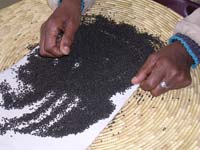
Ethiopia’s farmers and scientists pioneering in situ conservation and use

Today, in some of Ethiopia’s diverse, rain-fed environments a partnership has developed between farmers and researchers from the national genebank, a local NGO, Ethio-Organic Seed Action, and a Canadian NGO, USC-Canada, in its Seeds of Survival Programme (SoS). Since the 1980s, as a result of both loss of sorghum seed in the drier lowlands during the famine when people had to eat them to survive, and locally-bred and adapted varieties of durum wheat being replaced in the wetter highlands by uniform ‘high-yielding’ (high input) bread wheats, many farmers’ varieties (sometimes called landraces) were lost.
The then head and founder of the national gene bank, Dr Melaku Worede, recognised that farmers knew more about the range and characteristics of varieties than he did. Farmers also had bred varieties well adapted to local environments using multiple selection criteria. These could stand the stresses from climate fluctuations and pests better than the more uniform modern varieties that were replacing them and which, with their increasingly expensive inputs, led farmers into debt and did not perform as well when conditions were poor.
When Dr Melaku met farmers who had been unhappy with the newly introduced bread wheat and wanted to reintroduce the heterogeneous farmers varieties of durum wheats he made some improvements to the farmers varieties so that they yielded better but with little loss of biodiversity. This work, developed through a local farmers association, now involves the establishment of community seed banks, seed multiplication and farmers’ trials comparing compost-fed plots of the same farmers’ variety with fertiliser fed. Early results are showing greater yields at lower costs for the compost fed wheats. The SoS programme has spread not just around the country but around the world. It links the breeding skills and capacity of farmers with researchers who can join with them to develop better products suited to local environments.
Ethiopia has a better chance than most countries to safeguard and develop its agriculture biodiversity because ‘The seed supply from research that tends to erode genetic diversity very fast is still very small so genetic diversity is fairly intact’ according to Dr Tewolde Berhan Gebre Egziabher, director of Ethiopia’s Environmental Protection Authority. He feels that what makes Ethiopia so important today for genetic diversity is that unlike in many other places “farmers themselves still continue generating and regenerating their seed”.
Source: This is the text from Box 8.10 in The Future Control of Food. Compiled during a visit to Ethiopia, November 2006.
Seeds of Survival
Seeds of Survival (SoS) is the flagship programme of USC Canada, one of Canada’s oldest and most trusted international development organizations. The programme promotes long-term food security for marginal farming communities in developing countries.
SoS aims to ensure a secure source of food and livelihood for local farmers, without losing the resource base essential for sustaining it.
It also aims to promote a diversity of local crops, and to increase the diversity within local crops.
Ex situ seed saving

Cleaning seed by hand - it is the most effective way - before being sealed in foil bags to go into cold storage in the gene bank in Addis Ababa.